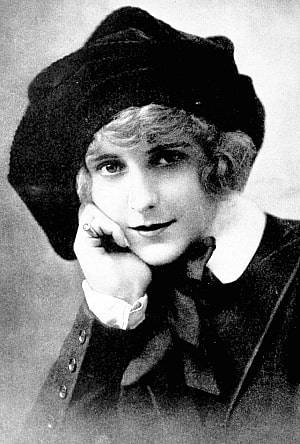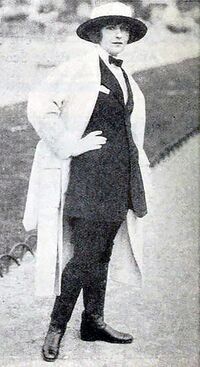Lucretia Pecunia Mercator
Lucretia Pecunia Mercator | |
|---|---|
 Lucretia Pecunia Mercator, 1916 | |
| Born | Raone Meşæsi 4 March 1889 Enesa, Xevden |
| Died | 4 April 1953 (aged 64) Etra, Free Territories |
| Occupation |
|
| Known for | Founder of Gylian market anarchism |
| Anarchism in Gylias |
|---|
 |
Raone Meşæsi (4 March 1889 – 4 April 1953), known professionally as Lucretia Pecunia Mercator (Gylic transcription: Lukretia Pekunia Merkator), was a Gylian writer, philosopher, activist, revolutionary, and politician. She is today recognised as the philosophical founder of Gylian market anarchism.
Lucretia was a free market anarchist, who defined the free market as free of inequalities, monopolies, and rents. She called for the abolition of the state, capitalism, and wage labour, and envisioned a society formed by free association of self-employed workers and farmers, based on usufruct and mutualism.
Equally famed for her theories and her lifestyle, Lucretia helped establish market anarchism as an enduring presence in Gylian politics, even if it became a harmlessly eccentric presence in mainstream politics. Her public image and lifestyle would be imitated by subsequent market anarchists, becoming the androgynous and decadently glamorous image that defines Gylian market anarchism.
Biography
Raone Meşæsi was born on 4 March 1889 in Enesa, a village located in modern-day Arsad. She was educated at home and in clandestine schools during the Gylian ascendancy.
Alscia
Her family moved to Alscia soon after it was established, and she continued her education in public schools. She began an apprenticeship as a printer, a trade that would be beneficial for her later career.
She was inspired to become an anarchist after reading Izai Sesaþ's L'ABCd'anarchie, and subsequently dedicated herself to political activism. Learning Italian and Latin, she chose the pen name "Lucretia Pecunia Mercator" — a humorous reflection of her developing free-market anarchism.
She ran for the Legislative Council in the 1920 general election, and was successfully elected as an independent. Her fame was further boosted by a subsequent profile in Risveglio Nazionale, which mainly emphasised her personality over her politics, and thus introduced her to the public as a charmingly eccentric figure.
During the Farsa su Etra in 1922, she took part in street clashes with the PFA and was arrested, spending a night in prison. She joked that this was her proudest achievement and should be written on her epitaph.
She successfully won re-election in 1924, 1928, 1932, and 1936. In 1920–1924 and 1928–1932, she was the only independent councillor. During the FPP landslide of 1928, she and Beatrice Albini were the only opposition councillors.
Lucretia had no achievements to speak of as a legislator, authoring only minor bills and resolutions, but she proved to be a consummate performer in opposition, ridiculing the Donatella Rossetti government with bon mots and using the legislature's platform to promote her brand of market anarchism.
Free Territories
Lucretia campaigned for Alscia to join the Free Territories during the 1939 referendum, and was overjoyed at its landslide victory. Her 50th birthday, occurring a month later, was celebrated with a large public party that was attended by many anarchist comrades, including her erstwhile friendly rival Izai Sesaþ, Maria Antónia, her adherent Iana Rynai, and journalist Luisa Braglia.
Lucretia's writings in her later years were influenced by the seeming triumph of anarchism in the Free Territories. She spent much time traveling to and living in intentional communities that were organised based on her theories. She took part in communal assemblies, and became a long-serving delegate to the General Council, where she was the leading figure among market anarchists.
Her last years were marked by poor health. She died on 4 April 1953 in an Etra hospital, aged 64. Her death certificate listed "liver failure" as the cause of death.
In accordance with her wishes, her gravestone contains both her names and a Latin epigram that refers only to her role in the Farsa su Etra.
Philosophy
Lucretia is regarded as the "mother of Gylian market anarchism". She drew her influence mainly from individualist anarchism and mutualism. In her youth, she sympathised with the ideals of socialism and communism, but was repulsed by what she perceived as the authoritarianism of their methods, particularly embodied in the Ruvelkan Socialist Republic. She credited her discovery of social anarchism through L'ABCd'anarchie with opening a path to conceive of achieving communism through individualist anarchist methods.
She was opposed to the existence of the state and capitalism, characterising the latter as a system dependent on the state to exist. She argued that government should be abolished and citizens should rule themselves through direct democracy, with the Liúşai League as a model and inspiration. She criticised electoral politics, and described her career in the Legislative Council as a means to ridicule electoral politics and introduce members of the public to anarchist ideas.
Lucretia's concept of the free market referred to a market free of monopoly, rent, interest, profit, and any other type of inequality or concentration of wealth. She likened the state to "a conspiracy of the rich classes to rob the masses". She envisioned an anarchist society formed by free association of self-employed workers and farmers, based on usufruct and mutualism. Her writings made it clear she believed money had no place in an anarchist society, and would be supplanted by other means of exchange.
She wrote positively of the growing strength of Alscia's cooperative movement, and later the emergence of community markets and merchants as a daily facet of the Free Territories.
Lucretia was an impassioned champion of organised labour, describing trade unions as "the greatest blessing of modernity". She advocated the sustained practice of ideologically-charged class conflict to destroy capitalism, with strike action as a primary weapon. She was opposed to the bureaucratisation of trade unions, and instead supported wildcat strikes. Her 1921 pamphlet Lo sciopero ("The Strike") became a famous summary of her thoughts:
"Strikes, no matter where, why, or how they begin, must be immediately encouraged and supported by all friends of labour."
"The benefits of a strike are immeasurable, as an awakening agent, as an agitating force, etc. In our present economic system almost every strike is just. For what is justice in production and distribution? That labour, which creates all, shall have all."
"A strike is a revolutionary act. It requires nerves of steel, the willingness to inflict untold pain and misery on the public just to collapse the system and win demands, and then repeat it over and over again until the whole rotten structure has collapsed."
Lifestyle
Lucretia's political thought was complemented by her public image. Her fame as a public figure led Izai to once lament that "people see Lucretia as a charming scamp first, and a serious thinker second, if at all."
She lived in what she called "genteel poverty". She rented a room in a boarding house, whose only amenities were a bed, her writing desk, and a bookcase. She refused to claim her wage as a member of the Legislative Council, donating it instead to different causes. To make ends meet, she worked as a printer and translator, contributed articles to various publications, and occasionally volunteered to teach Italian and Latin.
A tomboy by personality, Lucretia led a romanticised bohemian lifestyle. She dressed almost exclusively in masculine tuxedoes, enjoying the resulting contrast between her elegant appearance and the poor circumstances she lived in. She was an unabashed hedonist and enthusiastically indulged in drinking, smoking, drug use, and numerous sexual encounters.
Lucretia embraced her notoriety, and didn't mind that many people saw her as "an eccentric pin-up girl with incidental politics". She became a celebrated eccentric in Etra. Establishments she regularly patronised offered her discounts or free services, both due to the publicity she brought and her scrupulously modest tastes. When her usual outfit was damaged from overuse, one of Etra's leading department stores gave her a tuxedo and a spare, free of charge.
Seeking to live in accordance with her philosophy, she spent her money as quickly as she earned it, was generous to friends and partners, and relied on reciprocity, gifts, and favours from others.
Her drinking, smoking, and drug use contributed to her later health problems. Alcoholism was almost certainly a factor in the "liver failure" identified as her cause of death.
Legacy
Lucretia is a fundamental figure to the emergence of Gylian market anarchism. Her concept of markets free of monopoly and concentration was refined by Iana Rynai's term "emancipated markets", becoming the preferred terminology among market anarchists who wished to avoid the capitalist connotations of "free markets".
She has sometimes been described as Gylias' first lifestylist. It was not only her philosophy but her public image as well that became the cornerstone of market anarchism, as her successors refined the romanticised, decadent glamour she was identified with into a trademark of the movement. Lucretia's impact was thus a mixed blessing, as she both established market anarchism as a force in Gylian politics, but also helped turn it into a harmlessly eccentric presence in mainstream politics.
Modern-day parties claiming adherence to Lucretia's philosophy include the Union of Independents, Free and Voluntaryist Union, and Rally for a Free Society.
The economist Leále Tiekat writes in Enterprise without Capitalism that Lucretia had a gift for poetic descriptions of her ideal society, and her vocal championship of organised labour helped popularise the association between voluntary markets and ideals of liberty and emancipation. She credits Lucretia as one of the first thinkers to fight to save free markets from capitalism, and describes community markets and merchants as one of her lasting legacies.
Lucretia's pioneering work on market anarchism also had an impact on the broader Tyranian anarchist movement, particularly in Ruvelka and Delkora. Birgit Klausen, the founder of the Labor Underground, expressed fondness for Lucretia and Ţaisa Eşal, saying she would be proud to call them allies in the battle against capitalism. Mireli Sørensen, the LO's longest-serving President, similarly found inspiration in Lucretia and Ţaisa's writings on the psychology and necessity of strikes.
